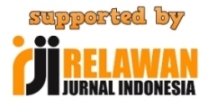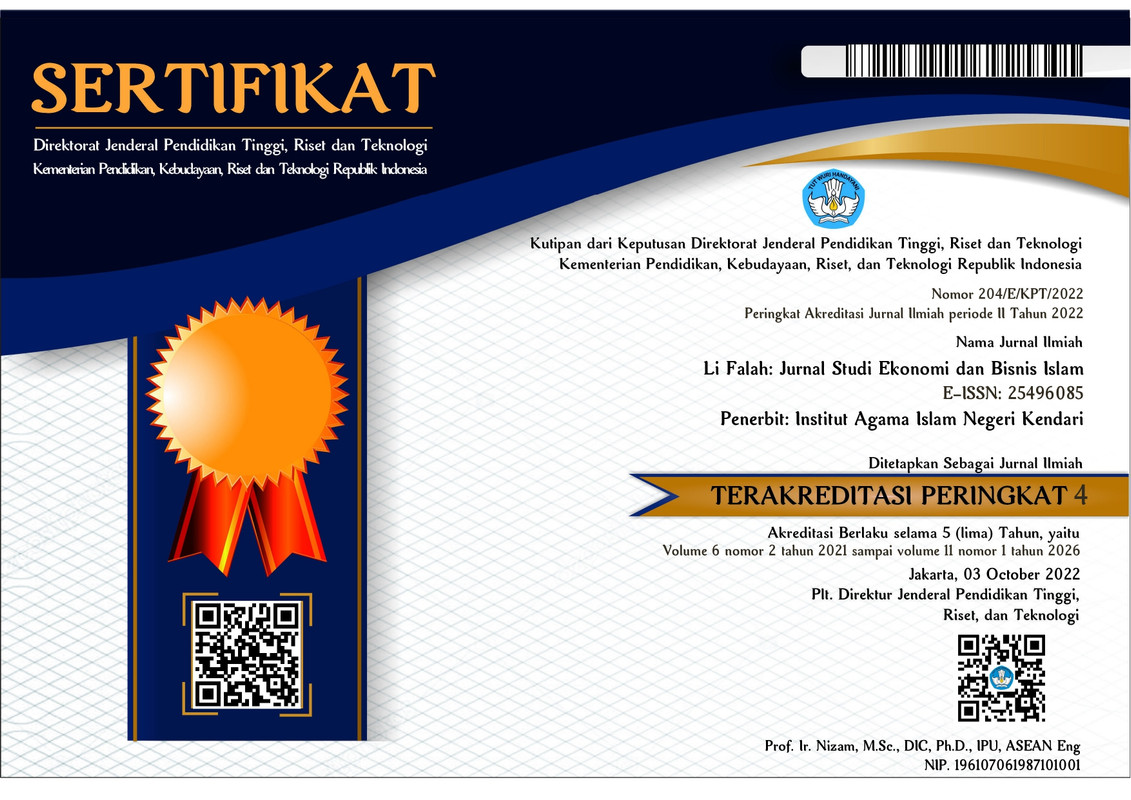Demographics Differences in the Microfinance Clients' Perception Towards Islamic Microfinance: The Case Of Nigeria
Abstract
This paper investigates the different perceptions of microfinance clients' demographic characteristics towards Islamic microfinance. The convenience sampling technique was adopted to select the study sample to collect data from the microfinance clients' beneficiaries in Kwara state. Four hundred data were obtained and analyzed on SPSS Version 25 using descriptive analysis, independent sample t-test, and one-way ANOVA. The findings indicate a statistically significant difference in the microfinance beneficiaries' perception of their demographic region, age, marital status, religion, and education level.
Keywords
Full Text:
PDFReferences
Abiola, B. (2011). Impact Analysis of Microfinance in Nigeria. International Journal of Economics and Finance., 3(4).
Al-Shami, S. S. A., Majid, I., Mohamad, M. R., & Rashid, N. (2017). Household welfare and women empowerment through microcredit financing: Evidence from Malaysia microcredit. Journal of Human Behavior in the Social Environment, 27(8), 894–910. https://doi.org/10.1080/10911359.2017.1345341
Aladejebi, O. (2019). The Impact of Microfinance Banks on the Growth of Small and Medium Enterprises in Lagos Metropolis. European Journal of Sustainable Development, 8(3), 261. https://doi.org/10.14207/ejsd.2019.v8n3p261
Alaro, A. A. M., & Alalubosa, A. H. (2019). Potential of Sharī’ah compliant microfinance in alleviating poverty in Nigeria: A lesson from Bangladesh. International Journal of Islamic and Middle Eastern Finance and Management, 12(1), 115–129. https://doi.org/10.1108/IMEFM-01-2017-0021
Asmawat, A. & Ahmad S. (2015). Impact of Islamic Microfinance on Improving the Income and Poverty Reduction of Microenterprises in Province Aceh: Case Study in Baitul Qiradh Aceh. Kontekstualita, 30(2).
Babajide, A. (2011). Impact analysis of microfinance in Nigeria. International Journal of Economics and Finance, 3(4), 217–225.
Babajide, A. A. (2016). Microsavings mobilization innovations and poverty alleviation in Nigeria. Savings and Development, 40(1), 1–28.
Basu, S., Roy, A., & Karmokar, S. (2020). Effectiveness of Microfinance on Household Income Generation Strategy in the Southwest Region of Bangladesh. Asian Journal of Social Sciences and Legal Studies, 2(3), 56–62. https://doi.org/10.34104/ajssls.020.056062
CBN. (, 2019). Licensed Microfinance Banks (Mfbs) In Nigeria As At December 31, 2019. Retrieved Oct 21, 2020, from https://www.cbn.gov.ng/Out/2020/FPRD/MFB311219.pdf
CBN. (, 2020). mfb regulation draft merged- Central Bank of Nigeria. Retrieved Oct 21, 2020, from The Central Bank of Nigeria: https://www.cbn.gov.ng/out/2020/fprd/mfb%20regulation%20draft%20merged.pdf
Ishaaq El-Mubarak, A.M.O., Mustapha, Z., Mohamed, A.M.T. & Ibrahim, G. (2020). Laws of Islamic Banking in Nigeria: Critical Review and Best Practice Proposal. International Journal of Academic Research in Business and Social Sciences., 10(3), 29- 42.
Jenyo, G.K., and Adebayo, O. (2014). Performance Appraisal Of Microfinance Banks In Nigeria: A Case Study Of Selected Microfinance Banks (In Kwara State). International Journal of Small Business and Entrepreneurship Research, 2(3), 55–63.
Kumari, J. A. P., Ferdous Azam, S. M., Khalidah, S., & Candidate, P. (2019). The effect of microfinance services on poverty reduction: analysis of empirical evidence in Sri Lankan perspectives. European Journal of Economic and Financial Research, 3, 109. https://doi.org/10.5281/zenodo.3541412
Ledgerwood, J, and White, V. (2006). Transforming Microfinance Institutions. Providing Full Financial Services to the Poor. The World Bank, Washington, D.C.
Maikabara A.A & Zakariyah, H. (2020). Poverty Eradication in the Light of Quran and Sunnah: A Maqassid Approach. Al-Hikmah International Journal For Islamic Studies and Human Sciences, 3(3).
Maikabara, A. A. (2020). Applicability of Islamic microfinance as an alternative tool for poverty eradication in Kwara state of Nigeria. Unpublished MSc Dissertation, International Islamic University Malaysia.
Maikabara, A. A., Aderemi, A. M. R., & Maulida, S. (2020). Investigating the viability of the charity-based model of Islamic microfinance for eradicating the impact of covid-19 on social wellbeing in Nigeria: A descriptive analysis. Journal of Islamic Economics Perspectives, 2(1), 114–122.
Maruf, O. (2013). Evaluation Of The Nigerian Microfinance Banks Credit Administration On Small And Medium Scale Enterprises Operations. International Review Of Management And Business Research. 2(2).
Michael Ayertey, N. (2008). Microfinance and Its Impact On Selected Districts In Eastern Region of Ghana.
Muhammad A.D & Muhammad A. (2013). Applicability of Islamic Micro-Investment, model (IMIM) In Kano State, Nigeria: Empirical Evidence. Australian Journal of Basic and Applied Sciences, 7(4), 535-542.
Muhammad T & Mamman D. (2017). Applicability of Islamic Microfinance Bank Solution to Poverty Reduction in the Northeast Nigeria. International Journal for Innovative Research and Development, 6(11), 25-31.
Mutalima, I. B. (2015). Responding to the voices of poor people through microfinance in Sub-Saharan Africa: an Action Research Study in Zimbabwe and Zambia. Middlesex University London.
Nairametrics. (2020). Nigeria’s unemployment rate jumps to 27.1% as at 2020 Q2. Retrieved Oct 20, 2020, from https://nairametrics.com/2020/08/14/breaking-nigeria-unemployment-rate-jumps-to-27-1/
Nor, A. N. M. (2019). The Chronology of Microfinance Development in Malaysia: A Review. KnE Social Sciences, 2019, 1271–1284. https://doi.org/10.18502/kss.v3i22.5124
Obaidullah, M. (2008). Introduction to Islamic microfinance. India: IBF Net (P) Limited.
Okpara, G. . (2010). Microfinance Banks And Poverty Alleviation In Nigeria. Journal Of Sustainable Development In Africa. Issn, 12(6), 1520–5509.
Otero, M. (1999). Bringing development back into microfinance. Journal of Microfinance/ESR Review, 1(1), 8-19.
Rahman, M. A., & Mazlan, A. R. (2014). Determinants of Financial Sustainability of Microfinance Institutions in Bangladesh. International Journal of Economics and Finance, 6(9), 107–116. https://doi.org/10.5539/ijef.v6n9p107
Rokman, W. (2013). The Effect of Islamic Microfinance on Poverty Alleviation: Study in Indonesia. Journal of Economic and Business, 14(2).
Saeed, A. (2019). Microfinance as a Vehicle of Liberal Political Ideals and Pakistani State. PUTAJ – Humanities and Social Sciences, 26(1), 67–90.
S.P.A. Ajibade & Co. Resources. (, 2020). Guidelines for Regulation and Supervision of Microfinance Banks in Nigeria. Retrieved Oct 21, 2020, from http://www.spaajibade.com/resources/guidelines-for-the-regulation-and-supervision-of-microfinance-banks-in-nigeria/
The world Bank. (, 2020). Nigeria Data. Retrieved Oct 20, 2020, from https://data.worldbank.org/country/nigeria
The world Bank. (, 2020). Nigeria releases a new report on poverty and inequality in country. Retrieved Oct 20, 2020, from https://www.worldbank.org/en/programs/lsms/brief/nigeria-releases-new-report-on-poverty-and-inequality-in-country
The World Bank. (, 2020). Understanding Poverty. Retrieved Oct 20, 2020, from https://www.worldbank.org/en/topic/poverty/overview
Wediawati, B., Effendi, N., Herwany, A., & Masyita, D. (2018). Sustainability of Islamic microfinance in Indonesia: A holistic approach. Academy of Strategic Management Journal, 17(3).
Wulandari, P., Kassim, S., Sulung, L. A. K., & Putri, N. I. S. (2016). Unique aspects of the Islamic microfinance financing process. Humanomics.
ZaidMahmood H., Abbas K & Fatima M. (2016). Islamic Microfinance and Household Welfare Nexus: Empirical Investigation from Pakistan. Journal of Global Entrepreneurship Research, 7(18).
DOI: http://dx.doi.org/10.31332/lifalah.v5i2.2260
Copyright (c) 2020 Abdullateef Abdulqadir Maikabara, Abdulmajeed M.R Aderemi, Sri Maulida

This work is licensed under a Creative Commons Attribution-ShareAlike 4.0 International License.
Li Falah : Jurnal Studi Ekonomi dan Bisnis Islam, Indexed In
Accredited By
View My Stats
Organized by : Fakultas Ekonomi dan Bisnis Islam
Published by : Institut Agama Islam Negeri Kendari
Jl. Sultan Qaimuddin No. 17 Baruga Kota Kendari Provinsi Sulawesi Tenggara
phone. +62401-3193710
Fax. +62401-3193710
Email: [email protected]



















